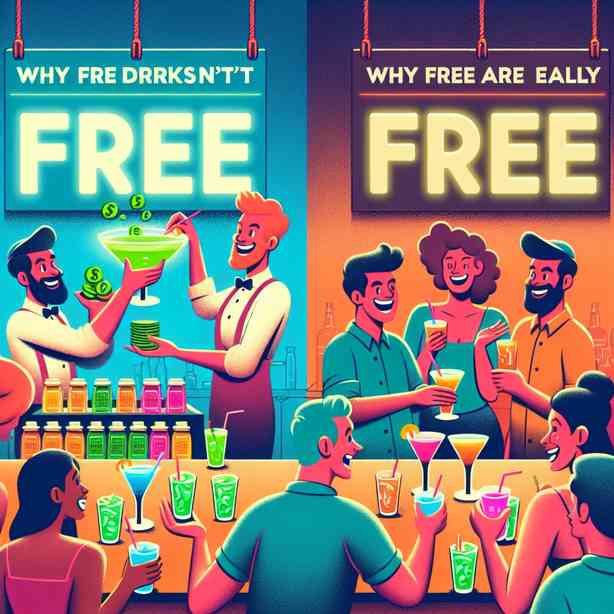
In many social situations, especially at bars, clubs, and various events, the phrase “free drinks” can sound appealing. However, it is vital to understand that these offerings are rarely free in the literal sense. Instead, the concept of ‘free drinks’ often masks underlying costs and implications that can significantly affect patrons. From hidden charges to social obligations, the allure of free beverages can lead to an array of unforeseen consequences.
Firstly, one of the most insidious aspects of “free drinks” is that they are often part of a marketing strategy. Venues frequently use complimentary drinks to lure customers into their establishments, creating a sense of obligation among patrons to spend more once they are inside. In essence, while the initial drink may come at no cost, the expectation is that customers will indulge in further purchases—the subsequent alcoholic beverages or food items—ultimately leading to a more expensive night than anticipated. This tactic exploits the psychology associated with perceived savings; patrons feel they are getting a deal, even when it merely entices them to spend more.
Moreover, free drinks can contribute to unhealthy drinking habits. When alcoholic beverages are offered without charge, individuals may feel encouraged to consume more than they typically would, leading to binge drinking. This not only endangers personal health but can also create risky situations, such as impaired judgment leading to accidents or regrettable decisions. The social pressure to participate in round after round of free drinks can overwhelm one’s better judgment, transforming a casual night out into an evening of excess.
In addition, the phrase “free drinks” can mislead guests into thinking there are no strings attached. However, venues may impose restrictions on the offer, such as requiring patrons to purchase food or reach a minimum spending limit. These stipulations can lead to frustration and confusion when customers receive their tab at the end of the night. Ultimately, what they thought was a cost-free experience turns into an unexpected financial burden, leaving many feeling deceived.
Social dynamics play an important role in the context of free drinks as well. In group settings, the dynamics can shift dramatically based on the availability of complimentary beverages. Those who partake eagerly can unintentionally pressure others to join in, leading to a situation where some feel obliged to drink more than they are comfortable with simply to fit in or avoid feeling left out. This social obligation can create an uneasy environment where genuine enjoyment is overshadowed by the expectation to consume alcohol.
Furthermore, the pursuit of free drinks can encourage irresponsible behavior, such as overindulgence, especially among younger individuals who may be less experienced with alcohol consumption. In some cases, venues fail to provide adequate supervision or responsible service training to their staff, which can exacerbate the risks associated with excessive drinking. This lack of oversight can lead to disorderly conduct, altercations, and even legal troubles, considerably detracting from what was intended to be an enjoyable outing.
It is also essential to consider the economic implications of free drinks on local establishments and the wider economy. While offering complimentary beverages may increase foot traffic and initial sales, the long-term sustainability of such practices can be questionable. When customers come to expect free offerings, it can serve to dilute the perceived value of the drinks and lead to reduced profitability for the venue. In a highly competitive market, maintaining a balance between attractive marketing strategies and financial viability becomes crucial.
On the flip side, some businesses attempt to make “free drinks” genuinely beneficial by hosting events that foster a sense of community or offer educational workshops where patrons can learn about various beverages while enjoying samples. These kinds of gatherings emphasize engagement over mere consumption and can help create memorable experiences without encouraging reckless behavior.
In conclusion, while the appeal of free drinks is hard to resist, it is essential to approach them with caution. Understanding the hidden costs—whether they manifest as financial burdens, social pressures, or health concerns—can help patrons make informed choices. The concept of “free” is rarely straightforward; it often comes with caveats that can lead to unexpected outcomes. By acknowledging these nuances, you can enjoy social outings in a way that prioritizes health, safety, and enjoyment without falling into the trap of overindulgence. Ultimately, the responsibility lies with each individual to navigate these situations wisely, ensuring that the allure of “free drinks” does not overshadow the importance of moderation and mindful drinking.


